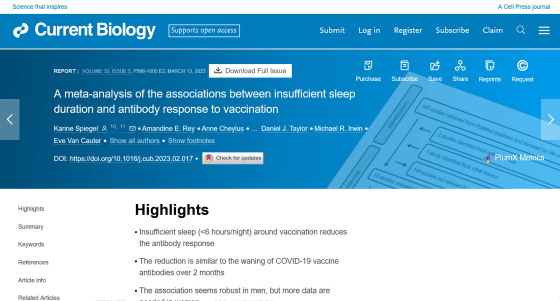Research results that the effect of the vaccine is weakened if the sleep time of the night before vaccination is short

A meta-analysis of the associations between insufficient sleep duration and antibody response to vaccination: Current Biology
https://doi.org/10.1016/j.cub.2023.02.017

Getting a good night's sleep could boost your | EurekAlert!
https://www.eurekalert.org/news-releases/982143
Poor sleep decreases vaccine effectiveness, especially for men | CNN
https://edition.cnn.com/2023/03/13/health/sleep-vaccine-immunity-wellness/index.html
Less than six hours' sleep cuts immune response to vaccines, data shows | Medical research |
https://www.theguardian.com/lifeandstyle/2023/mar/13/less-than-6-hours-sleep-reduces-vaccination-immune-response
Getting enough sleep is important to maintain a healthy mind and body, but many people say that on busy weekdays, sleep time will be shorter. Therefore, Dr. Karine Spiegel of the French National Institute of Health and Medical Sciences and his colleagues investigated the effect of sleep time on vaccine efficacy. We analyzed the results of seven studies that examined the amount of antibody available.
The research team compared ``people who slept 7 to 9 hours'' and ``people who slept less than 6 hours'' the night before vaccination. As a result, when sleep time was self-reported, the amount of antibody was lower in those with shorter sleep time, but there was no scientifically significant difference.
However, when sleep time was measured by objective measures based on laboratory monitoring and device monitoring, it was found that post-vaccination antibody levels significantly decreased when sleep time was less than 6 hours. Did. The reason for this, the research team believes, is that people tend to overestimate their sleep time each night.

In addition, when men and women were analyzed separately, changes in antibody production due to sleep duration were significant only in men, and variations were observed in women. The research team points out that the difference in the effect of sleep time on antibody production between men and women is probably due to the large effect of sex hormones on female antibody production.
“Immunology studies show that sex hormones influence the immune system,” Spiegel said. , There were no data on sex hormone levels in the studies summarized here.'
In addition, the negative impact of sleep deprivation on antibody production was found to be greater in adults aged 18 to 60 than in those aged 65 and older. In this regard, the research team points out that the elderly generally have less sleep time, so there was little change due to reduced sleep time.

Although the results of this study were only investigated for influenza and hepatitis A and B vaccines, the research team believes that these results can also be applied to vaccines for the new coronavirus infection (COVID-19). 'The way the immune system is stimulated is the same whether you're using the COVID-19 mRNA vaccine or the flu, hepatitis, typhoid, and pneumococcal vaccines,' said Michael Irwin, a professor at the University of California School of Medicine and co-author of the paper. It is.'
According to the research team, if you get the COVID-19 vaccine without getting enough sleep, the antibody response may weaken for two months. Co-author of the paper, Eve Van Cauter, professor emeritus at the University of Chicago, said, 'Good sleep not only amplifies, but may extend, the duration of vaccine protection.' 'And we find that people with pre-existing medical conditions, men, and obese people are less protective, all of which are factors beyond the control of individual people, but sleep can be modified.'

Related Posts:
in Science, Posted by log1h_ik







